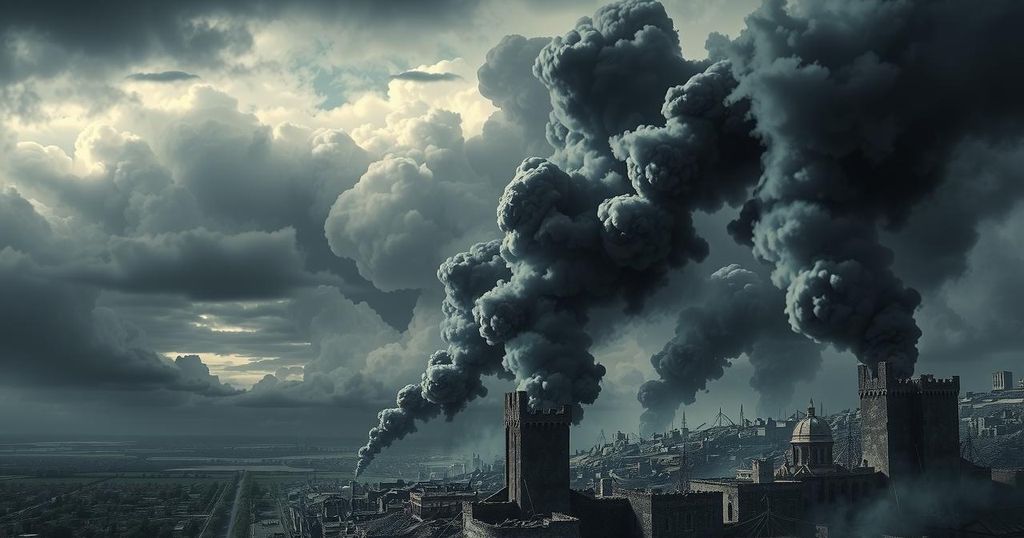Israel declared it will enforce a ceasefire throughout Lebanon after airstrikes, ignited by rocket fire from the region, led to Israeli bombs striking Beirut for the first time in months. Lebanese officials condemned the escalation, and Hezbollah denied involvement. The situation has prompted calls for investigations and required all parties to exercise restraint as tensions rise in the region.
On Friday, Israel announced its intent to enforce a comprehensive ceasefire across Lebanon following recent rocket fire, which provoked airstrikes on Beirut, marking the first occurrence during the fragile truce with Hezbollah that has persisted for four months. Lebanese Prime Minister Nawaf Salam condemned the strike on Beirut’s southern suburbs as a significant escalation, while French President Emmanuel Macron deemed it an “unacceptable” violation of the truce.
The Lebanese health ministry reported no casualties from the strikes in Beirut; however, the attacks in southern regions resulted in five deaths. This incident marks the second occasion of rockets being fired into Israel from Lebanon since the November ceasefire, with Hezbollah denying involvement both times. Prime Minister Benjamin Netanyahu asserted, “The equation has changed,” and emphasized that Israel would retaliate against any threats.
Israeli Defence Minister Israel Katz likened the situation to a condition of war, declaring that there would be no peace in Beirut if northern Israel experienced unrest. Despite the ceasefire, Israel has conducted air strikes targeting what it claims are Hezbollah military sites in southern and eastern Lebanon. Notably, Friday’s assault was directed at a Hezbollah stronghold in Dahieh, an area previously ravaged during last year’s conflict.
Lebanese President Joseph Aoun, speaking alongside Macron in Paris, indicated the necessity of an investigation but proposed that all signs suggest Hezbollah is not behind the recent rocket attacks. An AFP photographer documented the destruction, with the targeted building completely demolished, leading to public panic and heavy traffic as residents sought to flee the area.
The Israeli military confirmed that two projectiles were launched towards their territory, resulting in one interception and the other landing back in Lebanon. Subsequently, they reported strikes on various Hezbollah positions in southern Lebanon. Hezbollah reiterated its commitment to the ceasefire and denied participation in the day’s rocket incidents.
Under the ceasefire agreement, Israeli forces were expected to withdraw their troops from Lebanon by February 18, although they remain stationed at five strategic locations. The accord also mandates Hezbollah to relocate forces north of the Litani River, approximately 30 kilometers from the Israeli border, and to dismantle remaining military infrastructure.
In light of these developments, Prime Minister Salam urged swift action from his army to identify and detain those responsible for the rocket launches, asserting the importance of maintaining stability in Lebanon. The Lebanese army reported locating the origin of the rocket fire, positioned just north of the Litani River.
Macron indicated that the Israeli attack would be addressed with both U.S. President Donald Trump and Prime Minister Netanyahu, emphasizing that no actions justified such military responses. Meanwhile, the UN special envoy for Lebanon expressed deep concern over the escalating violence, stressing the imperative for all parties to exercise restraint to prevent a renewed conflict.
In conclusion, the recent escalation in Lebanon following rocket fire into Israel has significantly heightened tensions amidst an existing ceasefire with Hezbollah. Israel’s airstrikes and ongoing military operations reflect a commitment to respond forcefully to perceived threats. The Lebanese government is urged to swiftly identify the perpetrators behind the rocket incident while international leaders emphasize the necessity of restraint to avoid further conflict.
Original Source: www.al-monitor.com






